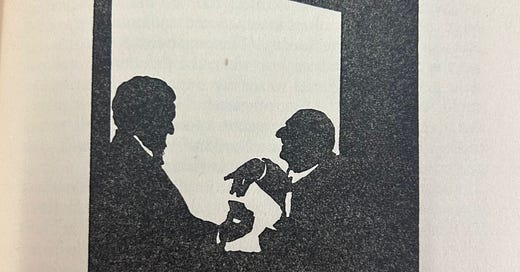Each Bruckner symphony is a different universe. Each Mahler symphony is a different world.
Bruckner works on a cosmic scale; his music is extraterrestrial. Mahler works on an Earthly scale; his music is terrestrial.
If Earth had no humans, Bruckner’s music would be of-this-world because it is earthy, but not Earthly. It’s certainly not cosmopolitan, because it’s not worldly either (the only dance Bruckner uses is the Ländler). Maybe you could go even further and say Bruckner is pre-industrial, but not pastoral. That’s why we recognize the world Mahler represents, because he’s post-industrial. And that’s why Mahler can afford to be pastoral, because you can only represent the pastoral world when the industrial world has overtaken it and made it “other” and past. This hasn’t happened yet in Bruckner’s music, or rather in the world it represents, which is still not a world but rather a matrix. In fact, you could say Bruckner’s symphonies are placeless, nonlocative.
We recognize ourselves, our spirit, in Mahler’s symphonies. We don’t see humanity in Bruckner’s, only the spirit of music.
Bruckner is nonrepresentational, except that you can hear the undulations of the spatial fabric. Mahler is mimetic—military bands, birds, church choirs. He’s also memoric: childhood (“Frère Jacques” in the first symphony). Another way of saying this is: Bruckner picks up where Beethoven left off in the Ninth, whereas Mahler picks up where Beethoven left off in the Sixth (“Pastoral”).
Mahler expresses the emotional life of humans. Bruckner expresses the emotional life of God. That’s why many people find Bruckner boring. It’s like the Queen. Who cared about Elizabeth’s emotional life? God-like royalty always have the least interesting emotional life. Their appearances are way more interesting; that’s why we watch the Royal Wedding. Mahler keeps up appearances, a form of compromise with his audience; Bruckner never panders, he is uncompromising. A good relationship is built on compromise. That’s why Bruckner doesn’t have a good relationship with his audience.
Bruckner’s music is the pain of becoming; Mahler’s is the pain of being.
Bruckner’s symphonies expand into a void; Mahler’s symphonies expand to fill a fixed frame. One of Steven Hawking’s proofs that the universe is finite is that, at night, the sky is largely dark. If the universe were infinite, there would be an infinite number of stars, and they would be dispersed in a similar way to how the stars we know about and can observe now are dispersed; so, the sky would thus be bright all the time if the universe were infinite, because there would be an ostensibly infinite number of stars. This is the way the frames of Mahler’s symphonies exists, like a finite universe. Bruckner’s are unframed, leading many to characterize his music as digressive or sloppy because it expresses an infinite universe filled with stars. This is why it’s easy to get bored by Bruckner—the scale, the duration, the thick harmonies, the slogging, the bombast, the intricate polyphony, the stops and starts—almost an infinite amount of difficulties for the listener. Like a night sky with an infinite number of stars, Bruckner’s symphonies are blinding.
The word “abyss” does not come to mind when thinking about Mahler’s symphonies.
Bruckner’s ecstasy is lethargic; Mahler’s is vivacious.
Bruckner (not Chopin, as an orchestra musician told me at a bar last weekend) is Schubert’s true successor. On January 7, I wrote in my Notes app, “Bruckner’s symphonies are Schubert’s piano sonatas in orchestral form: Long phrases, long buildups, staying on pulsing tonicizations, sudden key changes, silences, sudden turns to minor and back, motifs rather than melodies, not intense counterpoint.” To these I would add/modify: long periods, surprising modulations, abrupt halts and sudden transitions into a soft section, the mixture of lyrical and violent, the practice of both to pass the theme to a different register with a slight variation in texture and sometimes in melody, the heavy statement of a theme and the subsequent diversion from it like nothing happened (in contrast to Brahms’ developing variations method—he develops all his material thoroughly and completely), and, above all, a mystical quality. There are endless mysteries in both.
Remember, Bruckner kissed Schubert’s skull when his body was exhumed.
Bruckner is not a Romantic. He hides himself behind his music. He writes anonymously while Mahler writes like a celebrity. Plus, he isn’t nostalgic; he’s futuristic, just in the way that Bach used the antiquated method of counterpoint to be futuristic without being nostalgic. Also, he does not express estrangement from the world; the individual vs. world antagonism is totally absent—this is expressed in the fact that his music is at complete concord with itself, whereas there are pitched battles between parts in Mahler’s symphonies. Mahler was, after all, a better orchestrator than Bruckner.
There is no sex in Bruckner. Mahler can seduce. Softly: Think of the beginning of the Ninth, whose opening melody in the horns I’ve always thought Leonard Bernstein took to use in “I Have a Love” from West Side Story; it’s the tune for the line, “I love him, I’m his.” Ravenously: Think of the second movement of the Fourth, whose solo violin dances with the winds in a way that you can almost see them working each other’s hips.
We recognize ourselves, our emotions, in Mahler’s symphonies. You cry at Mahler because he expresses what you feel. You cry at Bruckner because you will never feel what he’s expressing; or, you cry because the music itself is so deeply surprising in its modulations and sequences.
Both composers give you the chills when you least expect them. You let out a breath like someone has told you, “it’s okay, you don’t need to hurt anymore.”
Without music, we wouldn’t know what feelings sound like, or what they feel like from the outside.



